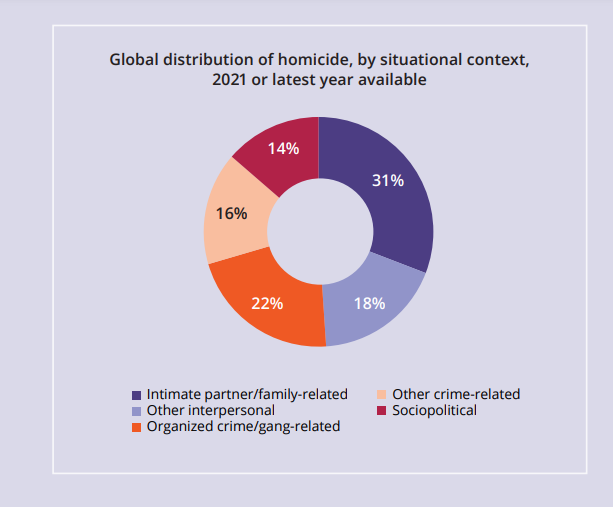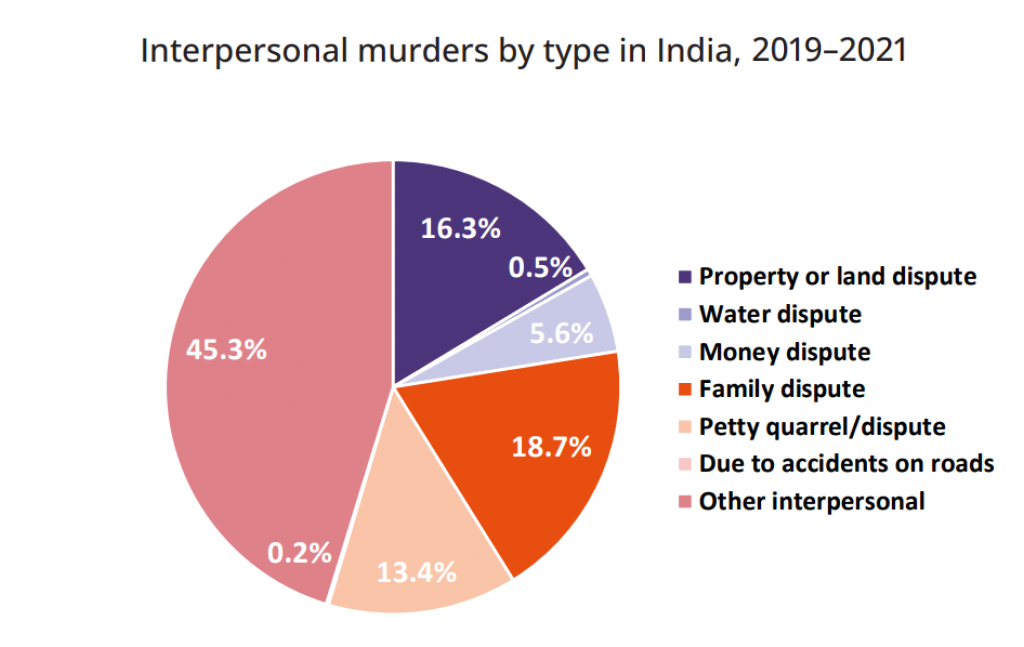Social Justice
UNODC’s Global Study on Homicide Report 2023
- 23 Dec 2023
- 4 min read
For Prelims: Global Study on Homicide Report 2023, United Nations Office on Drugs and Crime (UNODC), Homicide, Sustainable Development Goals.
For Mains: UNODC’s Global Study on Homicide Report 2023, Issues relating to poverty and hunger.
Why in News?
Recently, the United Nations Office on Drugs and Crime (UNODC) has released a Global Study on Homicide 2023 report, which found that homicide is a bigger killer than armed conflict and terrorism combined.
- Homicide is the killing of a person, whether lawful or unlawful, intentional or unintentional while Murder is the unlawful killing of a person with intent or malice aforethought.
- The report examines homicides related to criminal activities and interpersonal conflict, as well as “socio-politically motivated homicides” such as the deliberate killing of human rights activists, humanitarian workers and journalists.
What are the Key Findings of the Global Study on Homicide 2023?
- Homicide Trends:
- An average of around 440,000 deaths annually occurred due to homicide between 2019 and 2021.
- 2021 was exceptionally lethal, witnessing 458,000 homicides. Economic repercussions from the Covid-19 pandemic and a surge in organized crime, gang-related, and socio-political violence contributed to this increase.
- Despite a more than 95% surge in conflict deaths between 2021 and 2022, available data shows that the global homicide burden in 2022 was twice that of conflict deaths.
- Factors Contributing to Homicide:
- Organized Crime accounted for 22% of global homicides, reaching 50% in the Americas. Competition among organized crime groups and gangs can escalate intentional homicides significantly.
- Factors like climate change, demographic shifts, inequality, urbanization, and technological changes influence homicide rates differently across regions.
- Regional Variances:
- America has the highest regional homicide rate per capita (15 per 100,000 population in 2021).
- Africa recorded the highest absolute number of homicides (176,000) with a rate of 12.7 per 100,000 population. Rates in Africa did not show a declining trend compared to other regions.
- Asia, Europe, and Oceania had homicide rates far below the global per capita average of 5.8 per 100,000 population in 2021.
- Victims:
- Men constituted 81% of homicide victims and 90% of suspects, while women were more likely to be killed by family members or intimate partners.
- 15% of homicide victims in 2021 were children, amounting to 71,600 boys and girls.
- Targeted Killings and Impact on Aid Workers:
- Deliberate killings of human rights defenders, journalists, aid workers, etc., accounted for 9% of global homicides.
- Humanitarian aid workers faced a higher average number of fatalities during 2017-2022 compared to 2010-2016, indicating increased threat levels.
- Projections and Vulnerability:
- The global homicide rate is projected to decrease to 4.7 in 2030, though this falls short of the Sustainable Development Goals target.
- Africa is projected as the most vulnerable region due to its younger population, persistent inequality, and climate-related challenges.
What are the Key Highlights Related to India?
- Motives Behind Murders:
- Nearly 16.8% of murder cases recorded in India between 2019 and 2021 were linked to disputes over property, land, or access to water.
- About 0.5% (300 cases) of recorded murders in India between 2019 and 2021 were specifically attributed to water-related conflicts, highlighting the emergence of this issue as a significant driver of homicides.
- Factors Amplifying Water-Related Conflicts:
- Population Growth, Economic Expansion, and Climate Change: These factors were identified as exacerbating tensions over water access, contributing to increased violence related to disputes over water resources.






